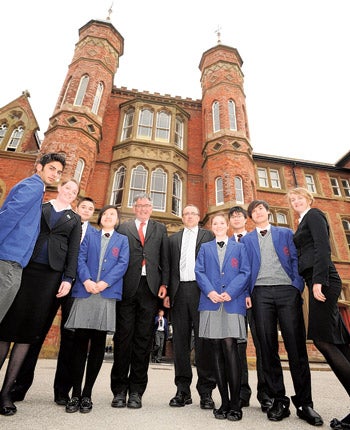Recession-hit private schools rescued by overseas pupils
One in three boarders is now from abroad, figures show

A record influx of overseas pupils has cushioned the effects of the recession for Britain's independent schools.
Figures out today show a 7.4 per cent rise in the number of overseas pupils – bringing the total to an all-time high of 23,307. However, the overall number of independent school pupils has fallen by nearly 3,000 as a result of the recession.
There are two reasons for the rise in overseas pupils: some schools have devoted more energy to recruiting overseas, fearing difficulties in the home market, and European families have been attracted by private schools offering the International Baccalaureate alongside A-levels. Wellington College, for instance, has seen a 20 per cent increase in overseas applications – most notably from Germany – since it began offering the IB, which gives pupils a broader range of sixth-form studies than A-levels.
The largest international group within private schools are Chinese and Hong Kong students.
The rise means that one in three boarding pupils in the UK is now from an overseas background.
Christopher Greenfield, chairman of the Boarding Schools' Association and principal of the International College at Sherbourne School in Dorset, said: "Boarding, with an estimated overseas earning of more than half a billion pounds each year, is becoming a vital part of the UK economy."
The annual census of the Independent Schools Council (ISC), which represents the majority of fee-paying schools, shows an overall 0.6 per cent drop in pupil numbers from 514,531 to 511,886. However, the drop in UK pupils is higher – 0.98 per cent or 4,279 pupils, the largest fall since the recession of the early 1990s.
The biggest drop was in four-year-olds starting private prep school – down by 5.2 per cent – which could start a trend, as its impact makes its way through the age groups. Leaders of the country's independent schools are determined to put a brave face on the decline in numbers.
David Lyscom, the ISC's chief executive, said: "In the deepest recession for over 70 years, with a fall in the gross domestic product of over 6 per cent, pupil numbers have fallen by only 0.6 per cent. In any other economic sector this would be seen as an outstanding success." He added: "The fall over the last year represents an average of only two pupils per ISC school."
However, headteachers were reluctant to predict that the hard times were over. Toby Mullins, headmaster of Sleaford College in West Sussex, said: "It has been more difficult this year than last [to recruit]. We're hoping we've reached the bottom but it would certainly be optimistic to say definitely that we have."
Figures from the early 1990s show it took two or three years before the impact of the recession was felt by private schools.
Today's census also shows the lowest fee increase at ISC schools since 1994, at 4 per cent. In addition, schools have been paring back on spending by abandoning planned capital projects. Total capital spending has fallen from £790.6m to £723.4m. However, heads warned there could be a rise in fees next year if Labour were voted back into government and implemented its planned rise in employer national insurance contributions.
Mr Mullins, who also represents the Society of Headmasters and Headmistresses of Independent Schools, said: "In my school, that will cost £70,000. We can't make a loss and – if our costs are going to rise – we'll have to put fees up."
The last time independent schools saw a drop in pupil numbers was 2005, although that was put down to a demographic decline.
Case Study: ‘Our students have a global outlook’
Rossall School, Fleetwood, Lancashire
The new internationalism in Britain's independent schools is most marked at Rossall School. Built in the 1840s as a boarding school, it began – like many other independent schools – to find difficulty in filling up its places with UK boarders in the 1990s and so made a determined effort to spend more time recruiting overseas.
As a result, it now has pupils from 40 different countries – 35 in its senior school and a further five in a centre specialising in overseas students. The largest international groups at the school, which is a mixed boys' and girls' school, are Chinese, Vietnamese and German. About two-thirds of the school's boarders are from overseas, as are about 35 per cent of all students in the 525-pupil senior school.
"It's not a school made up of 'people like us'," said its headteacher Dr Stephen Winkley. "It is very diverse and there's a globalistic outlook among the students. They mix with each other very well."
The range of countries covered by pupils at the school includes Albania, Togo and Korea. The school charges up to £29,000 a year for its overseas intake.
"We get some very high marks because of the wide background of our pupils," said Dr Winkley. "We are literally subsidising the places for day pupils – which means we can draw them in from a wider background which reflects the area we are in. The school has recently spent £1.5m on a refurbishment of its boarding accommodation."
Nationality of pupils of Rossall School
359: British
33: Chinese
33: German
31: Vietnamese
11: Hong Kong
6: Malaysian
4: Russian
3: Norwegian, Irish, American, Canadian, Taiwanese, Czech
2: Chilean, Singaporean, Italian, Japanese
1: Albanian, Austrian, Belgian, British/Mauritian, French, Georgian, Greek, Indian, Kazakh, Korean, Liberian, Portuguese, Romanian, Scottish, Spanish, Togolese, Turkish, Ukrainian
Subscribe to Independent Premium to bookmark this article
Want to bookmark your favourite articles and stories to read or reference later? Start your Independent Premium subscription today.

Join our commenting forum
Join thought-provoking conversations, follow other Independent readers and see their replies